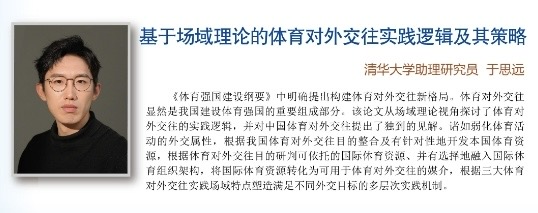 PDF(1365 KB)
PDF(1365 KB)


Practical logic and Strategies of Sports Diplomacy Based on Field Theory
YU Siyuan, FENG Yifu, LIU Bo
Journal of Capital University of Physical Education and Sports ›› 2025, Vol. 37 ›› Issue (4) : 425-432.
 PDF(1365 KB)
PDF(1365 KB)
 PDF(1365 KB)
PDF(1365 KB)
Practical logic and Strategies of Sports Diplomacy Based on Field Theory
The practical logic of sports diplomacy is the core component of the study of the basic principles of sports diplomacy. Based on the review of the research trends regarding the basic principles of sports diplomacy, Bourdieu’s field theory was used to analyze the internal components of the field of sports diplomacy. The practical logic of sports diplomacy is proposed as follows: in the international community, a sovereign state combines diplomatic activities with sports activities based on its own national interests, develops its own sports resources and relies on existing international sports resources to form sports-oriented way of showcasting its national social system and national culture, and then interacts with one or more other sovereign states in diplomacy, thereby supplementing traditional diplomatic methods and ultimately demonstrating the superiority of its social system and showcasing its national culture in the field of sports diplomacy to enhance international status. Based on this logic, a diagram of the structural elements of the field of sports diplomacy is drawn. On this basis, five practical strategies are proposed from the perspective of my country’s sports diplomacy.

sports diplomacy / practice logic / field theory / sports resources / diplomatic methods
| [1] |
崔乐泉. 中国式现代化与体育强国建设的中国模式[J]. 首都体育学院学报, 2022, 34(6):591-601.
|
| [2] |
刘桂海, 汪婷, 杨智国, 等. 改革开放40年中国特色体育外交:历程、经验与理论反思——基于“历史观、大局观、角色观”三重视角的考察[J]. 体育科学, 2020, 40(3):15-27.
|
| [3] |
|
| [4] |
王创业, 张德胜. 体育外交的实践逻辑:工具理性与资本再生产[J]. 上海体育大学学报, 2020, 44(5):47-54,62.
|
| [5] |
王创业, 张德胜. 体育对外交往的结构困境与路径突破:基于实践理论的分析[J]. 成都体育学院学报, 2023, 49(6):39-46.
|
| [6] |
白银龙, 舒盛芳. 场域理论视角下中国参与全球体育治理的困境、成因与路径[J]. 广州体育学院学报, 2024, 44(1):64-71,119.
|
| [7] |
于思远, 顾帅, 刘桂海. 国际政治心理学视域下我国体育对外交往的理论探索与实践应用[J]. 体育科学, 2023, 43(10):90-97.
|
| [8] |
中共中央马克思恩格斯列宁斯大林著作编译局. 马克思恩格斯选集(第三卷)[M]. 北京: 人民出版社,2012:937.
|
| [9] |
王建军. 浅谈体育与外交[J]. 外交学院学报, 1991 (3):71-73.
|
| [10] |
|
| [11] |
张德胜, 王创业, 胡羽. 国际体育即外交:体育外交的范式转移与理论再构[J]. 体育成人教育学刊, 2019, 35(2):37-42.
|
| [12] |
熊晓正, 张晓义. 从“先驱后进”到“奥运模式”中国体育外交政策的历史回顾[J]. 体育与科学, 2008, 29(3):40-45.
|
| [13] |
张德胜, 张钢花, 李峰. 体育外交在我国强国建设中的作用及实践路径[J]. 上海体育学院学报, 2018, 42(1):27-32.
|
| [14] |
钟秉枢, 刘兰, 张建会. 新时代中国体育外交新使命[J]. 体育学研究, 2018(2):37-44.
|
| [15] |
于思远, 刘桂海. 新时代中国特色体育外交理论体系的探索[J]. 武汉体育学院学报, 2018, 52(1):12-18.
|
| [16] |
布迪厄, 华康德. 实践与反思——反思社会学导引[M]. 李猛,李康,译. 北京: 中央编译出版社,1998:133-134.
|
| [17] |
|
| [18] |
宫留记. 布迪厄的社会实践理论[M]. 开封: 河南大学出版社,2009:155.
|
| [19] |
周冬霞. 论布迪厄理论的三个概念工具——对实践、惯习、场域概念的解析[J]. 改革与开放, 2010(1):192-193.
|
| [20] |
顾帅, 于思远, 刘桂海. 我国体育对外交往政策的历史流变、现实问题与完善策略——基于三维分析框架的文本量化研究[J]. 北京体育大学学报, 2025, 48(4):99-114.
|
| [21] |
福柯. 性史[M]. 姬旭升,译. 西宁: 青海人民出版社,1999:80.
|
| [22] |
|
| [23] |
黄金祺. 什么是外交[M]. 北京: 世界知识出版社,2004: 3.
|
| [24] |
温特. 国际政治的社会理论[M]. 秦亚青,译. 上海: 上海世纪出版社,2014:197.
|
| [25] |
陈思, 张晓义. 中国体育国际话语权研究述评[J]. 沈阳体育学院学报, 2019, 38(6):75-79,86.
主要采用文献资料法对中国体育国际话语权的研究现状进行总结,在此基础上分析研究不足,并提出研究建议,以期为中国体育国际话语权的学科体系建立和实际提升提供助力。研究认为:目前中国体育国际话语权的研究主要集中在体育国际话语权的概念和内涵、历史发展梳理、中国体育国际话语权存在的问题及提出提升策略。分析现有研究,仍存在如下不足:1)缺乏科学研究的理论基础;2)历史发展研究较为薄弱;3)缺乏全面的领域分析视角;4)对中国体育国际话语权的存在问题缺乏系统梳理;5)提升策略研究难以对实践指导产生重要作用。针对研究不足,提出如下研究建议:1)加强基础理论研究,尽快建立体育国际话语权的理论体系;2)加强理论与实践相结合。
|
| [26] |
|
| [27] |
|
| [28] |
邰峰, 李允允. 我国体育国际话语权提升的场域、机制与创新研究[J]. 沈阳体育学院学报, 2023, 42(6):130-136.
体育国际话语权是强化身份认同、体现国际地位、展现国家综合实力的重要因素。本文采用文献资料法、案例分析法,运用场域理论,从场域、机制、创新3个方面对我国体育国际话语权进行研究。研究认为:场域是提升体育国际话语权的基础,机制是提升体育国际话语权的保障,创新是提升体育国际话语权的动力。当前,我国体育国际话语权提升存在受西方阻碍、质量与效力不高、提升动力缺失等问题。优化路径:夯实基础,拓展话语传播的场域与途径;完善机制,保障话语生成的质量与效力;创新发展,提高话语生产的动力与驱力。
|
| [29] |
斯沃茨. 文化与权力:布迪厄的社会学[M]. 陶东风,译. 上海: 上海译文出版社,2006:142.
|
| [30] |
赵启正. 公共外交战略[M]. 北京: 学习出版社,2014:9.
|
| [31] |
约恩松, 霍尔. 外交的本质[M]. 肖玙,译. 北京: 北京大学出版社,2020:171.
|
| [32] |
顾帅, 于思远, 朱娜, 等. 美苏田径对抗赛形成的国际政治信号分析及其意义阐释[J]. 体育学刊, 2024, 31(3):14-20.
|
| [33] |
梁昊光, 李英杰, 宋佳芸, 等. “一带一路”建设中的体育交流与合作研究[J]. 首都体育学院学报, 2019, 31(3):195-200.
|
/
| 〈 |
|
〉 |